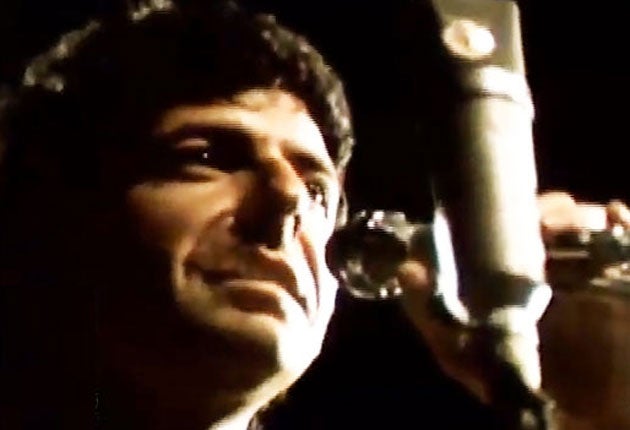Bird on a Wire: Up-close and personal portrait of genius
A candid 1970s documentary on Leonard Cohen premieres this month. Chris Mugan despairs of today's bland rock films

This month, a field in Wales hosts a film premiere, with the carpet rolled out for a music documentary not seen for 36 years. Bird on a Wire, shot during Leonard Cohen's 1972 European tour, will finally be shown as its maker intended at the Green Man Festival. Why the film was lost for so long is down to the fickleness of its subject. Despite his own famous indiscretion when he revealed the identity of the accommodating female protagonist in "Chelsea Hotel # 2", the poet-cum-singer got cold feet over this particular project. At the time, Cohen was on the verge of giving up live performance, so agreed to his manager's idea that a film could reach a wider audience.
His suggested director, Tony Palmer, was already an acclaimed film-maker, thanks to his documentary on music and politics, All My Loving, and notorious thanks to work on Frank Zappa's half-baked surrealist road movie, 200 Motels. Palmer would go on to achieve a minor coup, with his insight into the underground Northern soul scene, The Wigan Casino, and found further fame with his rock history All You Need Is Love, but even in the early Seventies he could insist on complete access to his subject.
Cohen assented to this, but decided the finished product was too confrontational. An eviscerated version limped out two years later and soon disappeared. Having had nothing to do with that print, Palmer neglected to keep a copy of his effort, so was overjoyed when the original rolls of film were discovered last year in a Hollywood warehouse. Even better, he has been allowed to re-create his original vision. Judging from snippets uploaded to YouTube, this ought to be a treat for any fan of the Canadian bard, but the film's importance goes way beyond nostalgia.
What is important is the intellectual heft that Palmer brought to the music documentary. You get a sense of his idealism in the access he demanded, but the director also wanted to break down the mystique between audience and idol. Early-Seventies music and confected glitter rock or Roxy Music's arty post-modern poses may spring to mind, but there was also a desire to show the graft behind the artifice. One of the most unlikely, yet rewarding, examples of this kind of insightful documentary is Slade in Flame. In this gritty depiction of a band's meteoric rise, Noddy Holder and friends play the members of Flame, a group that start out on the grubby club circuit and achieve fame after making various compromises.
Limited actors themselves, the show is stolen by Johnny Shannon, who had first found fame as Harry Flowers in Performance, and a young Tom Conti. Neither plays a goody in this dark look at showbiz. The former all too convincingly takes the role of the band's crooked manager, who vies for control of his charges with a smooth-talking marketeer, played by Conti, who cooks up the publicity stunts that gain notoriety for Flame. From dodgy contracts to pirate radio payola, Slade in Flame provides meaningful insights into the music industry's seamy underbelly, some of it based on Slade's own reminiscences.
Fat chance today's artists would allow their images to be undermined like this. Rather than letting TV producers or film-makers get on with things, we have cross-platform, multimedia releases that merely provide extra marketing channels that the artists themselves increasingly control. Take Stones in Exile, the film of the making of Exile on Main Street that the Rolling Stones ensured fit the campaign for their album's re-release.
About the only rock-related film of recent times to offer any unguarded insight was Metallica's Some Kind of Monster from 2003, which revealed the emotional tensions at the heart of a successful group. With its footage of a strung-out Cohen suffering the rigours of a hectic touring schedule, Bird on a Wire provides something similar, a reminder that rock films can be more than promotional fluff.
Join our commenting forum
Join thought-provoking conversations, follow other Independent readers and see their replies
Comments
Bookmark popover
Removed from bookmarks